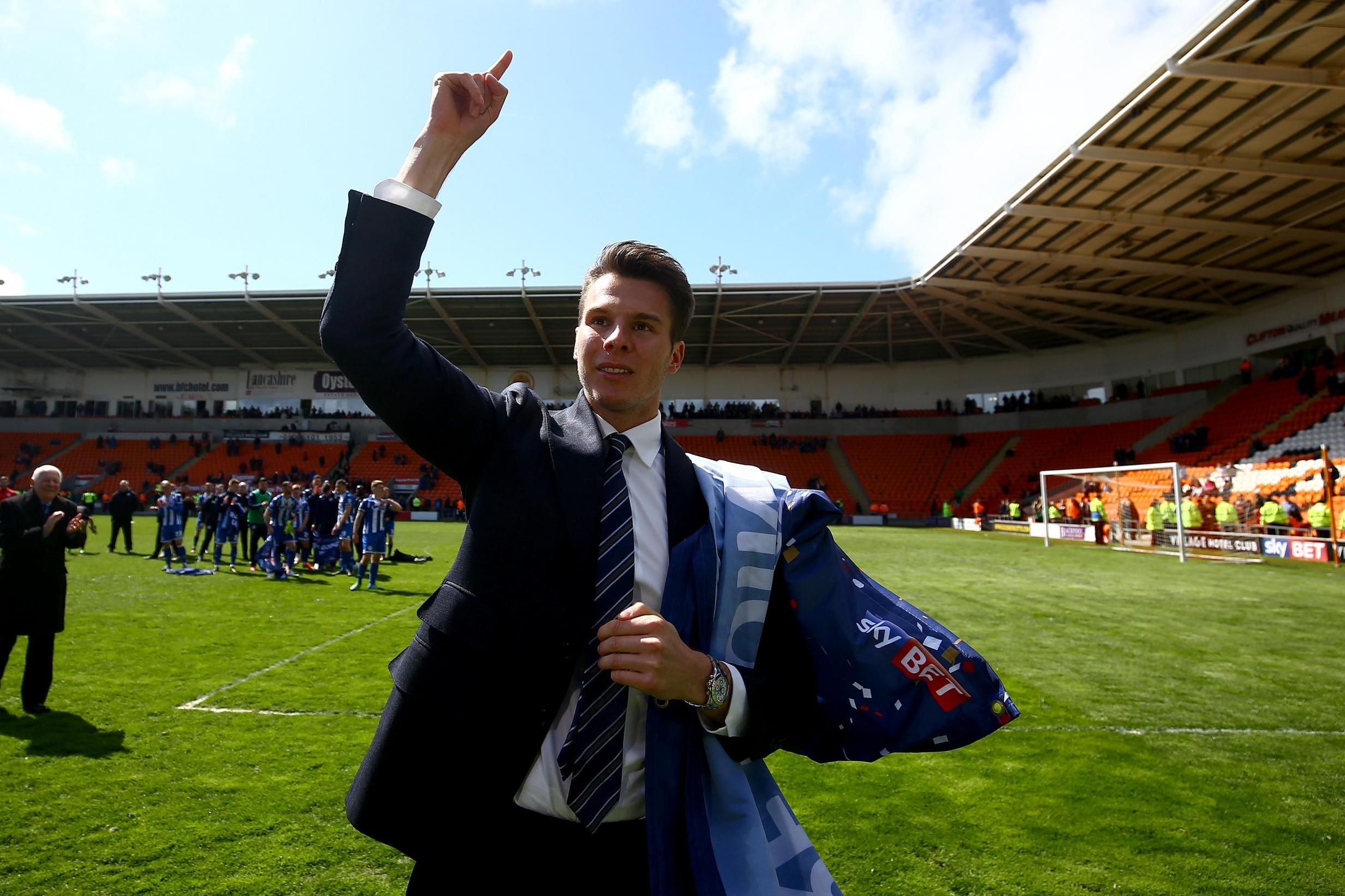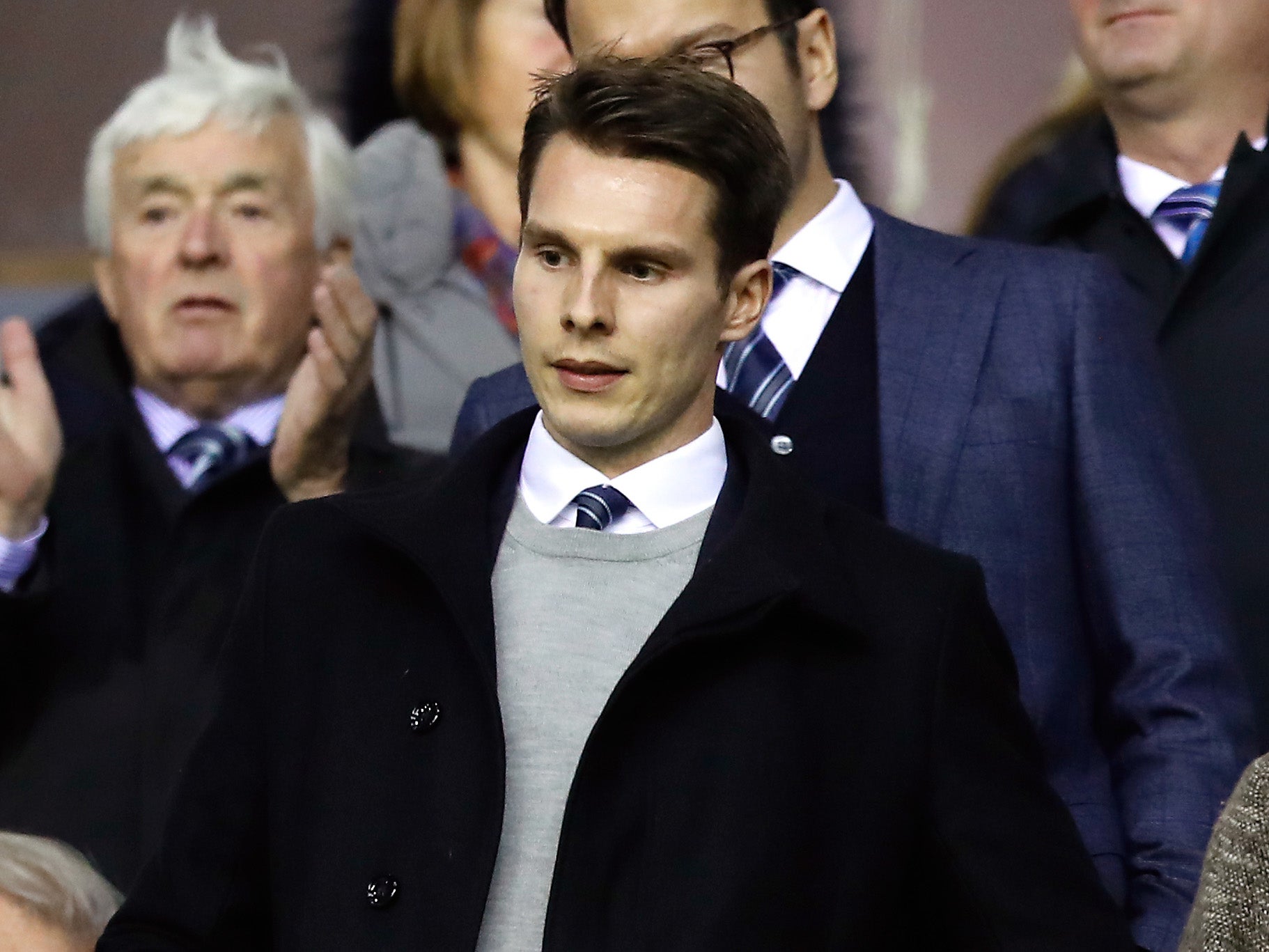David Sharpe: English football’s youngest chairman on why his family had to sell Wigan Athletic
Exclusive Interview: Sharpe opens up in his first interview since handing the keys of his family’s kingdom over to the Hong Kong-based firm International Entertainment Corporation

Your support helps us to tell the story
This election is still a dead heat, according to most polls. In a fight with such wafer-thin margins, we need reporters on the ground talking to the people Trump and Harris are courting. Your support allows us to keep sending journalists to the story.
The Independent is trusted by 27 million Americans from across the entire political spectrum every month. Unlike many other quality news outlets, we choose not to lock you out of our reporting and analysis with paywalls. But quality journalism must still be paid for.
Help us keep bring these critical stories to light. Your support makes all the difference.
“I’ll never have that feeling again,” David Sharpe says, as he pauses to look sombrely across the table. He’s reflecting on the bizarre afterlife of stepping away from a club he’s spent nearly his entire existence immersed in.
Wigan Athletic is all Sharpe has ever known. From when his grandfather Dave Whelan acquired the club in 1995, when Sharpe was only four years old, right the way up to becoming English football’s youngest ever chairman, aged 23, and then finally handing the reins on to new owners six months ago, it’s been a long life with the Latics.
He’s seen them through the highs of five promotions, eight seasons in the Premier League, and winning the FA Cup – even sharing Jägerbombs with friends in the Royal Box at Wembley after beating Manchester City – and then the lows of slumping back to League One, and their push to stabilise once more. It makes every sense, then, that it’s been a shock to the system adjusting to this new life without Wigan absorbing every moment of it.
As Sharpe opens up in his first interview since handing the keys of his family’s kingdom over to the Hong Kong-based firm International Entertainment Corporation (IEC), he admits that at first it was particularly hard coming to terms with selling the club. Fleeting boyhood dreams of being permanently attached to Wigan were sobered fast with the realisation that the economic climate outside the top flight was too dangerous to play with, and that he needed to find somebody else who could carry that burden.
“When I was younger, and initially when I took over, I felt like this [club] was ours for life,” he tells The Independent. “But the reality hit home. When I took over, I was looking at projections for years ahead, and not one of the forecasts for the next five, six or even seven years were remotely positive, unless we were in the Premier League. It was sad from an emotional point of view, I still am. But I also think when you look back at it, when you look at the stark reality, we had to do that deal. For the long-term future of my family, and for the football club, it made sense.”
“We’d achieved everything that we wanted to achieve,” Sharpe adds. “My granddad, definitely. What else could we achieve? We’d been in the Premier League, we’d been in Europe, we’d won the FA Cup. For Wigan, we’d won our World Cup. It was just getting to the point where you can sometimes stay somewhere too long, and it can go quickly downhill and people can forget you for all the good things that you did.”
****
It was March 2015, just as Wigan were headed for their second relegation in three seasons, when a “shock” phone call came from Whelan in Barbados to say that he was retiring, and that Sharpe would be taking over. Though at first he argued his grandfather should stay on, worrying he might not be ready, the young adult slipped quickly into those shoes, and overnight his name around offices at the DW stadium switched from David to “Mr Chairman”. He had already been working there for four years, but this was quite a jump. A degree of traditional respect did come paired with his new title, but drawing real esteem from around the club and its fans took time to accumulate, especially when there was one judgemental factor on so many minds.
“Everyone commented on my age. They were saying ‘he doesn’t know what he’s doing’, ‘silver spoon’, all the usuals,” Sharpe says. “I never doubted myself at all. I think my age people looked at and thought ‘he’s not got the experience it takes’, but why when people buy a football club from the far east or Dubai – who have no experience of football whatsoever – why is it accepted that they know what they’re doing? I always felt comfortable in my abilities, because that’s the environment I grew up in.”
During a three-year stint as chairman, Wigan bounced between League One and the Championship – two relegations, two promotions. There’s been a lot to celebrate, but a lot to learn, too. Hopping in at the deep end has shown him the fragility that boards across the Football League and beyond face in keeping their clubs afloat.

Luckily, while Sharpe’s grandfather was still owner, cash flow was never a threatening concern for the Latics, and therefore the two of them could walk away with heads held high. But Sharpe notes it’s been upsetting to watch teams like Bolton and Blackpool face such financially troublesome times. As money becomes increasingly tangled in the promotion narrative – especially in the raging battle towards the top of the Championship – one burning issue for the 27-year-old is that far too many prospective buyers go flying into ownership without thinking twice about bank balances.
“The reality is if you’re not wealthy enough and not worth over a certain amount, don’t buy a football club because it’s not a business decision. It is a shame to see other clubs run like that. People try to get involved when a club’s at League One, thinking they can get it on the cheap, they can get them up to the Championship, and maybe they can sell it. Nobody’s thinking about the what ifs. What if it doesn’t get sold? Who’s going to pay their wages?
“Everybody in football likes to think about the best case scenario. The majority of times I like to look at the worst case scenario, because the worst case scenario is the football club going out of business. And I had to do everything I could to make sure we never got to that situation.”
With fans frequently hurling blame at the game's authorities for the lack of rigorous tests and regulations, Sharpe insists there’s little they can do to stop careless owners themselves. “I think the only way clubs outside the Premier League can be more sensibly managed in terms of from the EFL’s point of view is having a percentage of wages per turnover ratio. I think that’s the only way. I mean, with FFP now you can lose £43m quid over three years, and I’ve been in meetings where owners have voted to lose more than that.”
****
As Wigan taste a small moment of joy, securing safety and a second successive season in the Championship, it suggests a degree of hope as their new journey under IEC really begins. As for Sharpe, as he sits cross-legged with a smile in a Wilmslow restaurant, there is a new voyage for himself, too, as he starts his career as an agent for the recently formed 366 group. He’ll be helping look after talent across various sports, from football to cricket and boxing. He’s been itching to get to work, even though it’ll mean spending his Saturdays in a different stadium from now on.

While his granddad is now enjoying retirement, it’s an odd feeling for them both to venture back to the DW, and to something they’d been a part of for 23 years. The only statue outside the ground is of Whelan clutching the FA Cup. “He’ll go into the stadium and staff will still call him the boss. It’s quite strange because when you walk in, it was the home he built, and it’s not his anymore. It’s a strange feeling.
“To see the new owners sat in the seats I was sat in, wearing Wigan coats, it’s quite bizarre,” Sharpe adds, shaking his head. “Sometimes you just want to have a say on things, and give your opinion… but you can’t, you’ve just got to let it go.
“I’m not going to tell them how to run Wigan Athletic. I’m always here to help, to pass on advice, and so is my grandfather. But when you’ve paid a lot of money for something, you’ve got every right to do it your own way. And that’s what they should do, stick to their beliefs and hopefully things are successful. We’ll see.”
Join our commenting forum
Join thought-provoking conversations, follow other Independent readers and see their replies
Comments